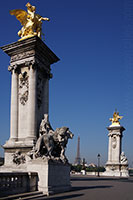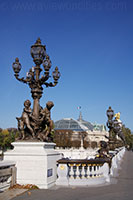Most people consider the 19th century Pont Alexandre
III the most beautiful bridge in Paris. It is without a doubt the city's
most opulently decorated bridge.

Orientation
Aligned with the Esplanade des Invalides, the Pont Alexandre III connects the Grand and Petit Palais on the right bank with the Hôtel des Invalides on the left bank.
Construction
The bridge was built at the end of the 19th century as part of a series of projects undertaken for the
 Universal
Exposition of 1900. The exposition took place on either side of the
Seine river and the new bridge would enable the millions of visitors to
more easily cross the river.
Universal
Exposition of 1900. The exposition took place on either side of the
Seine river and the new bridge would enable the millions of visitors to
more easily cross the river.

Construction of the bridge, designed by the architects Résal
and Alby, took almost 3 years. The structure was first prefabricated
in a factory and later transported and assembled by
a large crane.
One of the requirements for the bridge was that it should not obstruct the view on the Invalides and Champs-Elysées. This resulted in a very low 40 meters (132 ft) wide bridge with a single 107.5 meters (353 ft) long span and a height of only 6 meters (20 ft).
One of the requirements for the bridge was that it should not obstruct the view on the Invalides and Champs-Elysées. This resulted in a very low 40 meters (132 ft) wide bridge with a single 107.5 meters (353 ft) long span and a height of only 6 meters (20 ft).

The bridge is lavishly decorated with lampposts and
sculptures of cherubs and nymphs. On each end of the Pont Alexandre III
are large gilded statues on 17 meters (56 ft) high granite pillars.
Each of the ornaments on the bridge was created by a different artist.
Tsar Alexander III
Even though construction of the bridge only started
in May 1897, the first stone was already laid by the Russian Tsar
Nicolas II in October 1896. The bridge - which was to symbolize
Russian-French friendship - was named after his father, Tsar Alexander
III.
Universal Exposition of 1900
The Pont Alexandre III opened just in time for the
Universal Exposition of 1900 together with several structures that still
stand today like the Gare d'Orsay, the Petit Palais and the Grand Palais. The exposition would attract an impressive 50 million visitors.
No comments:
Post a Comment